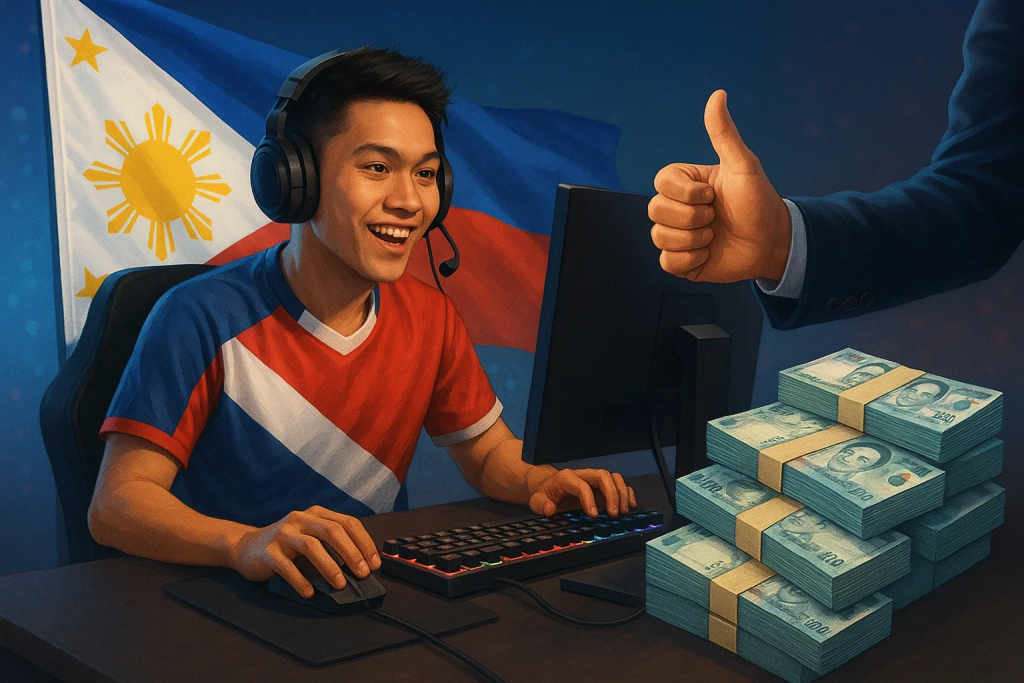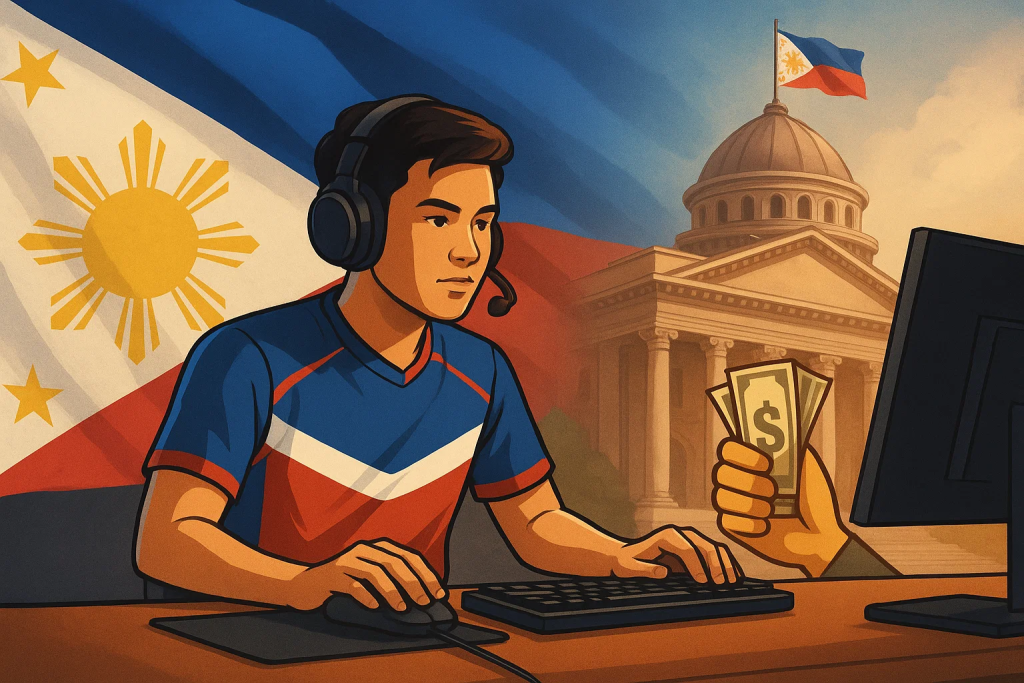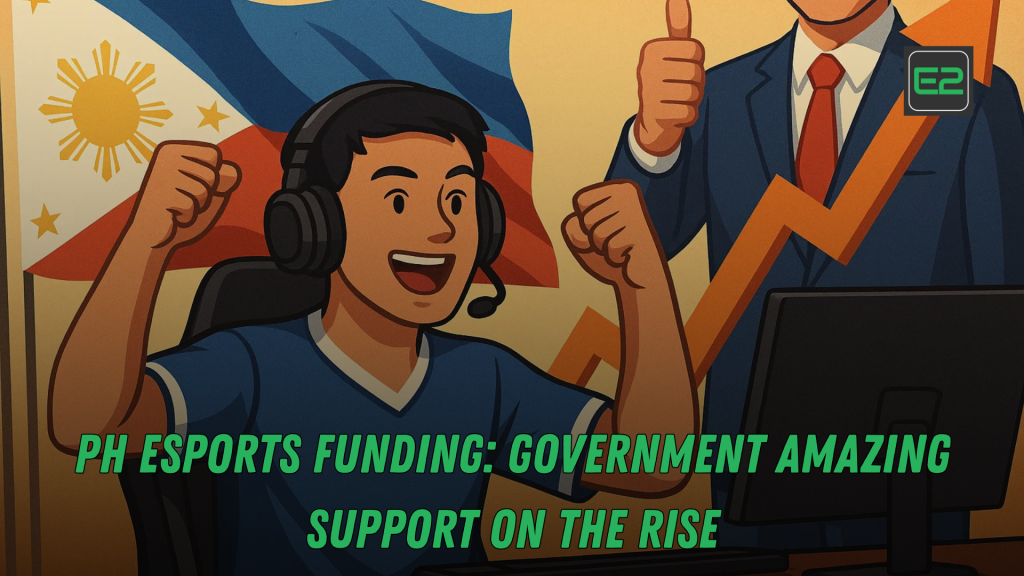Table of Contents
TL;DR (Executive Summary)
Government support for Philippine esports is gaining momentum across policy, budgets, and programs. Key milestones include SEA Games medal status (2019), national recognition of PESO as esports’ governing body under the Philippine Olympic Committee (2020), expanding cash incentives for national athletes under RA 10699, and fresh legislative efforts to create a Philippine Esports Commission to mobilize funding and standards. Complementary pushes from DOST (talent & game-dev ecosystem) and DICT (infrastructure & cybersecurity) strengthen the foundation. For teams, schools, and event organizers, this article offers a step-by-step funding strategy, sponsorship hybrid models, and 12-month KPIs—plus a FAQ at the end to answer common questions.
Why “Government Support” Matters Now
If you work in PH esports—whether as a team owner, coach, athlete, tournament operator, school patron, or brand—public support meaningfully lowers risk and accelerates scale:
- Legitimacy & access: Recognized national status improves visa processing, elite training access, and international representation. In 2020 the Philippine Olympic Committee (POC) formalized PESO as the governing body for esports, unlocking clear pathways for national selection and compliance.
- Cash incentives & allowances: Under RA 10699, medal-winning national athletes and coaches receive government cash incentives; PSC reports continued releases (e.g., PHP 74M awarded to SEA/ASEAN Para medalists in 2023). Esports national team members (SIBOL) at the SEA Games fall within this system when officially fielded as national athletes.
- Policy tailwinds: Esports became a medal event at the 2019 SEA Games hosted by the Philippines, signaling state-level acceptance. More titles and medals followed at Hanoi 2021 (played 2022).
- Emerging legislation: A 2025 House Bill proposes a Philippine Esports Commission (PEC) with mandates to mobilize funding, standardize formats, coordinate with PSC, DepEd, CHED, DICT, DTI, NYC, TESDA and more. It explicitly empowers government to secure resources for esports development. (Status: bill; not yet law.)
- Ecosystem boosters: DOST highlights esports/game-dev as a growing economic ecosystem (bootcamps, skills pipelines), while DICT is fortifying connectivity and cybersecurity (Mobile Connectivity Index upticks; National Cybersecurity Plan 2023–2028)—all vital for tournaments, training, and broadcast ops.
Bottom line: Funding is rising because policy legitimacy and infrastructure readiness are converging. The opportunity is real—if stakeholders align with national priorities and compliance rules.

A Quick Timeline of Government Recognition & Support
2018–2019: SEA Games leap
- In late 2018, esports was officially added as a medal sport for the 2019 SEA Games in Manila—an unprecedented regional milestone.
- 2019 saw SIBOL compete as the Philippine national esports team under the SEA Games apparatus. Public funding mechanisms routed via PSC and organizing committees were in play for the multi-sport hosting.
2020: Governance clarity
- The POC recognized the Philippine Esports Organization (PESO) as the national governing body for esports (associate member of the POC), solidifying the official NSA pathway (despite disputes from other groups).
2022–2023: Incentives & program continuity
- PSC continued to implement RA 10699 (National Athletes and Coaches Benefits and Incentives Act), releasing cash incentives to national medalists across multi-sport events, demonstrating an established public mechanism applicable when esports is a recognized national delegation.
2024–2025: Toward institutional expansion
- In 2024, the House approved on final reading a bill exempting athletes’ rewards and incentives from taxes, signaling more net benefits for medalists and donors (subject to bicam/implementing rules).
- In 2025, a House Bill proposed the Philippine Esports Commission to mobilize funding, set standards, and coordinate across agencies—explicitly naming esports as a sector deserving structured public support. (Again, proposed bill, not yet enacted.)
Understanding the Public Funding Stack (and Where Esports Fits)
Think of support as four layers:
- Incentives for national medalists (RA 10699)
- When esports is officially part of a national delegation (e.g., SEA Games), medal-winning players and coaches are entitled to cash incentives under the law and its IRR. This sits on top of any private rewards.
- Multi-sport hosting & delegation budgets (PSC & organizing bodies)
- PSC manages funds for training, international participation, and incentives. While yearly line items vary, PSC continues to facilitate allowances, training prep, and incentive releases for qualified athletes/teams.
- Ecosystem-level programs (DOST, DICT, CHED/DepEd, DTI)
- DOST: Skills bootcamps, game-dev support, research, and technology initiatives that uplift esports-adjacent talent.
- DICT: Connectivity expansion and cybersecurity plans—critical for tournament integrity, anti-DDoS, and broadcast reliability.
- CHED/DepEd: While not “esports-specific,” scholarships and campus-sport frameworks can integrate varsity-style esports and academic credit/aid where schools adopt it.
- Prospective institutional hub (proposed PEC)
- The 2025 bill envisions a Philippine Esports Commission that can standardize competitions, coordinate budgets, and mobilize funding with other agencies—potentially a game-changer for predictable support. (Status: pending legislation.)
“Rising Support” by the Numbers (and Signals)
- SEA Games medal event adoption (2019) created a precedent for public-sector inclusion of esports, strengthening the case for ongoing funding during multisport cycles.
- POC’s PESO recognition (2020) provided one authoritative NSA, streamlining national team selection and compliance, a prerequisite for state benefits and representation.
- Cash incentive disbursements have been regular for national medalists across sports (PSC cited PHP 74M released in July 2023 for SEA/APG medalists).
- Legislative updates (2024–2025):
- Bill granting tax exemptions for athlete rewards passed the House—reducing friction for donors and boosting take-home incentives.
- Esports Act bill (2025) seeks a fund-mobilizing commission—formalizing esports as a sector for public investment and standards.
- Digital readiness: DICT touts improvements in connectivity indices and is implementing a National Cybersecurity Plan (2023–2028)—imperatives for safe, high-quality online competition and streaming.
- Ecosystem nurturing: DOST’s programs (e.g., Power Up bootcamps) promote game-dev and esports talent pipelines—future-proofing skills that feed competitive teams, production, and analytics.
These developments don’t guarantee unlimited budgets—but they confirm directional growth in public recognition, resources, and readiness.
How Teams and Event Operators Can Access (and Justify) Support
1) Align with National Objectives
When approaching PSC, LGUs, or (prospectively) PEC and agency partners:
- Public value first: emphasize youth development, STEM skills, digital careers, and tourism/events—not just prize pools.
- Compliance & safeguarding: show policies on minors’ participation, anti-match-fixing, anti-harassment, anti-doping (where applicable), and cybersecurity for online events. Pair with DICT’s cybersecurity guidance to build confidence.
- Education pathways: partner with schools/HEIs to integrate credit-bearing programs, internships (broadcast ops, data analytics, event management), and mental-health support.
2) Build a Co-Funding Model (Public × Private)
Government rarely funds 100%. Combine:
- Public: venue subsidies, athlete allowances, training camps, visa facilitation, and incentive eligibility if your roster is nationally sanctioned.
- Private: sponsorships (telco, fintech, FMCG, peripherals), media rights, merch, digital memberships, and crowd-sourced patronage.
3) Present a “Return on Public Spend” Deck
Deliver a crisp 10–12-slide proposal with:
- Objectives linked to youth & skills outcomes.
- Event design: title list, tournament format, anti-cheat, broadcast plan.
- Participation metrics: teams, regions, gender inclusion, student majority.
- Economic impact: jobs, vendor spend, hotel nights (if on-site), local SMEs in booths.
- Digital reach: projected watch hours, peak CCU, and content plan.
- Safeguards: minors’ curfews, parental consent flows, codes of conduct.
- Budget map: what’s public (infrastructure, allowances) vs. private (prize pool, marketing).
4) Lock in NSA Recognition (Where Applicable)
If your event claims to be a national qualifier or your team claims national representation, ensure you’re aligned with PESO standards and selection protocols to protect athletes’ eligibility for state incentives under RA 10699.
For Schools and LGUs: A Starter Kit to Tap Public Support
Schools (Senior High/College)
- Pilot varsity-style esports with coach contracts, S&C basics, and academic policies.
- Offer credit-bearing coursework in event production, shoutcasting, and sports analytics.
- Use CHED and institutional merit aid frameworks to support scholars participating in esports programs (institutional policy dependent).
LGUs (Cities/Provinces)
- Co-host youth circuits at public venues, pair with IT job fairs and STEM workshops.
- Partner with DICT regional offices for connectivity checks and cybersecurity briefings ahead of online legs.
- Integrate women’s divisions and para-friendly formats to align with inclusion mandates.
Safeguards & Compliance: What Government Wants to See
- Integrity: Anti-cheat stack, match-fixing education, reporting channels, and VOD retention rules.
- Child protection: Verified guardian consent, time-of-day constraints, and screen-time management.
- Health: S&C routines to prevent RSI; sleep and hydration protocols.
- Cybersecurity: DDoS mitigation, account hygiene, MFA, and SOC escalation plans mapped to DICT guidance.
- Data privacy: Consent flows for players and viewers (email lists, sign-ups).
- Gambling separation: Clear, public no-betting policies and ad vetting to avoid regulators confusing esports with gambling activities—an explicit priority noted in the 2025 Esports Act bill.
Sample Budget (Regional Qualifier, Hybrid LAN/Online)
Scale: 16 invited/qualified teams, 3-day LAN finals, 4-week online qualifiers
- Production (LAN): LED/backdrop, cams, comms, stage ops, uplink: ₱1.2–1.8M
- Broadcast: TD+ops, graphics, replay, casters, studio days: ₱800k–1.2M
- Venue & network: hall rental, fiber, backup LTE, generators: ₱600k–900k
- Talent & staff: observers, refs, medics, security: ₱400k–700k
- Teams support: travel stipends, meals, hotel subsidy: ₱500k–800k
- Prize pool: private-led with sponsor naming: ₱500k–1.5M
- Marketing & media buy: ₱300k–600k
- Contingency (10–15%)
Public ask: venue/network subsidy, security/medics, youth program tie-ins, basic allowances.
Private: prize purse naming, category sponsors (telco/handset/fintech/peripherals/food), merch.

12-Month Roadmap to Make Your Case Irresistible
Q1 — Foundations
- Finalize NSA alignment (PESO) for qualifiers; publish integrity code and minors’ policy.
- Secure letters of cooperation from LGU and DICT regional office (connectivity & cybersecurity brief).
- Publish safeguards deck for parents, schools, and sponsors.
KPIs: 3 institutional MOUs; 1,000 sign-ups for open qualifier; 30 schools engaged.
Q2 — Pilot & Proof
- Run online legs with clean ops and transparent officiating.
- Release mid-program report: participation, watch hours, infra incidents (if any) and fixes.
- Host two DOST-style learning sessions (careers in esports/game dev).
KPIs: 250 peak CCU; 100K watch minutes; zero integrity breaches; 40% student participation.
Q3 — Community & Inclusion
- Add women’s bracket and campus invitational.
- Launch coaching clinics with NSA guidance; integrate S&C and sports psych basics.
KPIs: +25% women participation; 15 schools sending teams; player well-being survey baseline.
Q4 — LAN Finals & Policy Wins
- Deliver safe, family-friendly LAN finals with local SMEs as vendors.
- Publish a comprehensive impact report for PSC, LGUs, DICT, DOST, CHED, sponsors.
KPIs: 2,000 on-site attendees; 1M social reach; renewal interest from 70% sponsors; 2 policy partnerships for next season.
Risks & How to Mitigate
- Legislative uncertainty: The proposed Esports Act is a bill, not yet law. Plan with current frameworks (PESO, PSC, RA 10699) and treat PEC items as aspirational/parallel lobbying.
- Online gambling confusion: Maintain zero gambling associations; vet sponsors rigorously; add no-betting disclaimers and stream moderation.
- Cyber threats: Adopt DICT-aligned cybersecurity basics (MFA, DDoS playbook, incident response).
- Travel/visa: Package your NSA letters and event credentials cleanly; start early for international legs.
- Player welfare: Structured training hours, screen-time caps for juniors, and proactive mental-health referrals.
FIFA Esports Empowers the SEA Games Selection: Timeline of Success
Strong Call-to-Action (CTA)
Ready to turn public momentum into real resources for your program?
- Teams/Orgs: Message your LGU & PESO liaison this week and request a 30-minute alignment call on qualifiers or clinics.
- Schools: Pilot a credit-bearing esports module (production or analytics) with CHED guidelines and publish a parent-facing safeguards brief.
- Brands: Co-fund women’s brackets, youth clinics, and integrity tech—get measurable community and policy impact, not just logos.
Want a free proposal template (NSA alignment + safeguards + budget + KPI dashboard)?
Comment “SEND ESPORTS FUNDING KIT” with your city/region and role (team, school, LGU, brand). We’ll share a ready-to-customize deck.

Frequently Asked Questions (FAQ)
1) Is there already a Philippine Esports Commission?
Not yet. A 2025 House Bill proposes creating one—called the Philippine Esports Commission (PEC)—with powers to mobilize funding, standardize competitions, and coordinate with PSC/DepEd/CHED/DICT/DTI and others. It’s a bill, not a law, so current pathways still rely on PESO/POC, PSC, and existing agency programs.
2) Do esports athletes get government cash incentives like other national athletes?
3) What proof of “national” status do teams need?
4) How does government infrastructure policy help esports?
5) Are there public scholarships specifically for esports?
Sources & Key References
- SEA Games esports medal status (2019)—ESPN; PNA. ESPN.comPhilippine News Agency
- PESO recognized as esports NSA by POC (2020)—ESPN, Manila Bulletin. ESPN.comManila Bulletin
- RA 10699 and PSC incentive disbursements—Lawphil; PSC. LawphilPhilippine Senate Commission
- Esports Act (2025 House Bill)—Full text (HB 3751). Congress Documentation
- DOST statements & programs—PNA; DOST bootcamps. Philippine News AgencyDOST-NCR – Spearheading Innovations
- DICT connectivity/cybersecurity—DICT news; PIA brief on National Cybersecurity Plan. Dictionary of the PhilippinesPhilippine Information Agency
Final Word
Esports in the Philippines has moved from curiosity to recognized competitive field—with laws, budgets, and agencies increasingly leaning in. By aligning with national outcomes, keeping integrity & child-safety front and center, and documenting clear ROI, teams and organizers can tap more public support than ever. The window is open—build your proposal, pick your partners, and play to win.
Government support for Philippine esports is accelerating across policy, funding, and infrastructure. Since esports became a SEA Games medal event in 2019 and the Philippine Olympic Committee recognized PESO as the national governing body (2020), national-team pathways and eligibility for state benefits have clarified. Under RA 10699, medal-winning esports athletes and coaches can receive cash incentives when fielded as part of the official national delegation.
Parallel initiatives from DOST (skills, game-dev ecosystem) and DICT (connectivity and the National Cybersecurity Plan 2023–2028) strengthen competition integrity, broadcast reliability, and program delivery. A 2025 House Bill proposes a Philippine Esports Commission to mobilize funding and standardize programs (still a bill, not law).
For teams, schools, and event operators, the article outlines a playbook: align proposals with youth development, education, and tourism outcomes; pair public support (venues, allowances) with private sponsorships; and present ROI via participation, inclusion, economic impact, and digital reach. It details safeguards for integrity, child protection, health, privacy, and anti-gambling separation; a hybrid LAN/online sample budget; and a 12-month roadmap with KPIs for pilots, women’s brackets, school tie-ins, and LAN finals. FAQs clarify that PEC isn’t enacted yet, PESO alignment protects eligibility, and CHED/school frameworks can support varsity-style esports tracks.
